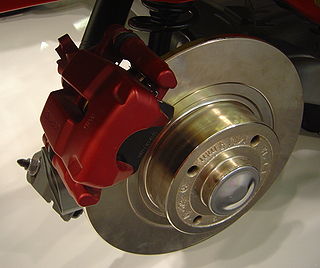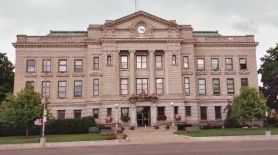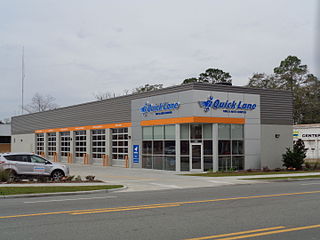Related Research Articles
Negligence is a failure to exercise appropriate and/or ethical ruled care expected to be exercised amongst specified circumstances. The area of tort law known as negligence involves harm caused by failing to act as a form of carelessness possibly with extenuating circumstances. The core concept of negligence is that people should exercise reasonable care in their actions, by taking account of the potential harm that they might foreseeably cause to other people or property.

A disc brake is a type of brake that uses the calipers to squeeze pairs of pads against a disc or a rotor to create friction. There are two basic types of brake pad friction mechanisms: abrasive friction and adherent friction. This action slows the rotation of a shaft, such as a vehicle axle, either to reduce its rotational speed or to hold it stationary. The energy of motion is converted into heat, which must be dispersed.

In motorsports, a pit stop is a pause for refuelling, new tyres, repairs, mechanical adjustments, a driver change, as a penalty, or any combination of the above. These stops occur in an area called the pits, most commonly accessed via a pit lane which runs parallel to the start/finish straightaway of the track and is connected to it at each end. Along this lane is a row of garages outside which the work is done in a pit box. Pit stop work is carried out by the pit crew of up to twenty mechanics, depending on the series regulations, while the driver often waits in the vehicle.

Stump v. Sparkman, 435 U.S. 349 (1978), is the leading United States Supreme Court decision on judicial immunity. It involved an Indiana judge who was sued by a young woman who had been sterilized without her knowledge as a minor in accordance with the judge's order. The Supreme Court held that the judge was immune from being sued for issuing the order because it was issued as a judicial function. The case has been called one of the most controversial in recent Supreme Court history.
In some common law jurisdictions, contributory negligence is a defense to a tort claim based on negligence. If it is available, the defense completely bars plaintiffs from any recovery if they contribute to their own injury through their own negligence.

United States v. Alkhabaz, 104 F.3d 1492 was a case brought against University of Michigan undergraduate Abraham Jacob Alkhabaz, a.k.a. Jake Baker, related to several incidents regarding snuff stories that he wrote while he was a student at the University of Michigan. Alkhabaz was charged with violation of 18 U.S.C. s 875(c), communicating via interstate or foreign commerce threats to kidnap or injure another person. The case raised immediate First Amendment concerns and is considered an important one in the history of cyber law.
The spinner on automobile wheels historically refers to knock-off hub nuts or center caps. They may be the actual, or intended to simulate, the design used on antique vehicles or vintage sports cars. A "spinner wheel" in contemporary usage is a type of hubcap or inner wheel ornament, that spins independently inside of a wheel itself when the vehicle is in motion and continues to spin once the vehicle has come to a stop.
Kumho Tire Co. v. Carmichael, 526 U.S. 137 (1999), is a United States Supreme Court case that applied the Daubert standard to expert testimony from non-scientists.

Dolan v. United States Postal Service, 546 U.S. 481 (2006), was a case decided by the Supreme Court of the United States, involving the extent to which the United States Postal Service has sovereign immunity from lawsuits brought by private individuals under the Federal Tort Claims Act. The Court ruled that an exception to the FTCA that barred liability for the "negligent transmission of mail" did not apply to a claim for injuries caused when someone tripped over mail left by a USPS employee. Instead, the exception only applied to damage caused to the mail itself or that resulted from its loss or delay.
Massachusetts v. Environmental Protection Agency, 549 U.S. 497 (2007), is a 5–4 U.S. Supreme Court case in which Massachusetts, along with eleven other states and several cities of the United States, represented by James Milkey, brought suit against the Environmental Protection Agency (EPA) represented by Gregory G. Garre to force the federal agency to regulate the emissions of carbon dioxide and other greenhouse gases (GHGs) that pollute the environment and contribute to climate change.

A flat tire is a deflated pneumatic tire, which can cause the rim of the wheel to ride on the tire tread or the ground potentially resulting in loss of control of the vehicle or irreparable damage to the tire. The most common cause of a flat tire is puncturing of the tire by a sharp object, such as a nail or pin, letting the air escape. Depending on the size of the puncture, the tire may deflate slowly or rapidly.
Implied consent is consent which is not expressly granted by a person, but rather implicitly granted by a person's actions and the facts and circumstances of a particular situation. For example, if a person is unconscious as a result of injuries sustained during a traffic collision, medical treatment may be provided to that person, despite the unconscious person being unable to expressly grant consent for that treatment.

Two-dimensional rotation can occur in two possible directions or senses of rotation. Clockwise motion proceeds in the same direction as a clock's hands relative to the observer: from the top to the right, then down and then to the left, and back up to the top. The opposite sense of rotation or revolution is anticlockwise (ACW) or counterclockwise (CCW). Three-dimensional rotation can have similarly defined senses when considering the corresponding angular velocity vector.

Williamson v. Mazda Motor of America, Inc., 562 U.S. 323 (2011), was a decision by the Supreme Court of the United States, in which the Court unanimously held that Federal Motor Vehicle Safety Standard 208, promulgated by the National Highway Traffic Safety Administration, does not federally preempt state tort lawsuits against auto manufacturers from injuries caused by a defective lack of certain types of seat belts.
General Accident Insurance Co South Africa Ltd v Xhego and Others is a case in the South African law of delict, particularly the area of compensation for motor vehicle accidents. The case was heard in the Appellate Division, by Joubert JA, Van Heerden JA, Smalberger JA, F H Grosskopf JA and Van Coller AJA, on November 18, 1991, with judgment handed down on November 29. The appellant, whose attorneys were Silberbauers, Cape Town, and Symington & De Kok, Bloemfontein, was represented by BM Griesel. The respondents, whose attorneys were Coulter, Van Gend & Kotze, Claremont, and Webbers, Bloemfontein, were represented by BJR Whitehead.

Bank of Montreal v Stuart is a decision of the Judicial Committee of the Privy Council on appeal from the Supreme Court of Canada. It deals with the principle of undue influence in relation to contracts, in the particular context of dealings between spouses. Decided in 1910, the case continues to be cited in the courts in Canada and in England and Wales.

Quick Lane Tire and Auto Center is a global automotive chain that provides oil changes, tire rotation, multi-point inspections and other express services. Currently headquartered in Dearborn, Michigan, Quick Lane is owned by Ford Motor Company, there are 825 locations as of February 2018. Some stores are stand-alone operations or some are attached to the dealership. Quick Lane is designed for dealers to pick up additional work to replace deceased warranty work. Quick Lane offers routine vehicle auto services including oil and filter changes, light repair services such as brake repairs and tire replacement.

Venning v Chin (1974) 10 SASR 299 is a Supreme Court of South Australia full court judgment, by which it was decided that in trespass cases, the onus lies on the defendant to disprove fault. However, for injuries caused in highway accidents, the onus is on the plaintiff to prove fault on the part of the defendant.
A centerlock wheel is a type of automobile wheel in which the wheel is fastened to the axle using a single, central nut, instead of the more common ring of 4 or 5 lug nuts or bolts.

In Taylor v. City of Saginaw, et al., No. 17-2126, the United States Court of Appeals for the Sixth Circuit held that the practice of “chalking” in which parking enforcement officers apply chalk to mark the tires of parked vehicles in order to track the duration of time for which those vehicles have been parked, constitutes a search under the Fourth Amendment to the United States Constitution. The court also held that two exceptions to the search warrant requirement—the community caretaker exception and the motor vehicle exception offered by the government—do not apply to the practice of chalking tires. Taylor v. City of Saginaw is the first case in which chalking was alleged to violate the Fourth Amendment.
References
- ↑ "Hon. Jane E. Markey Judge Profile on Martindale.com".
- ↑ "Motor Vehicle Service and Repair Act (Act 300 of 1974)". Michigan Legislature. 1974.
- ↑ Gordon, Aaron (23 October 2019). "Does Tire Rotation Include Tightening Lug Nuts? Michigan Court Thinks About It For Awhile, Concludes 'No'". Jalopnik. Retrieved 2019-10-24.
- ↑ Huetter, John (October 23, 2019). "Mich. court: Tire rotation still 'performed' under MVSRA even if lug nuts not tightened correctly". Driven Communications. Retrieved 2019-10-24.